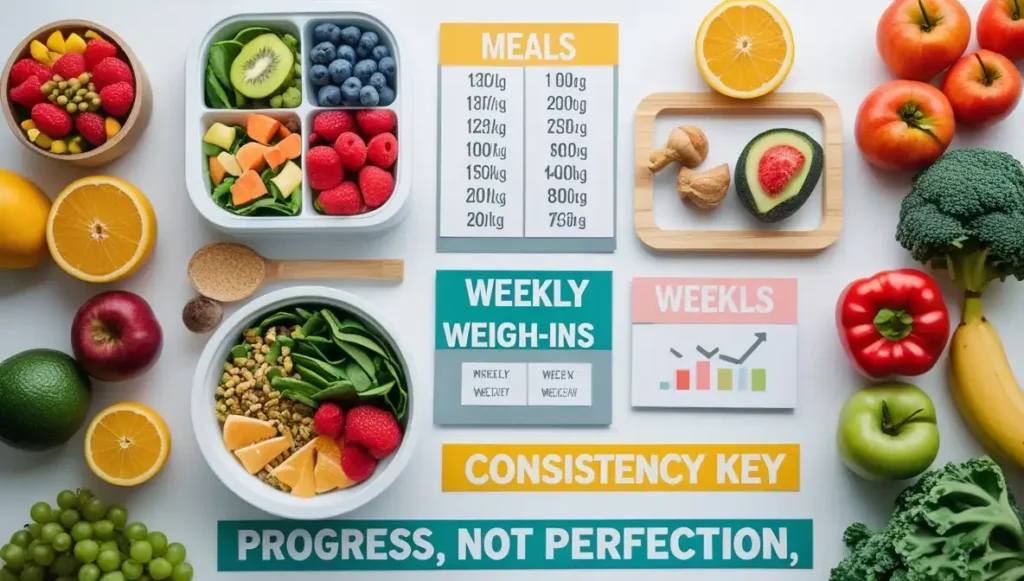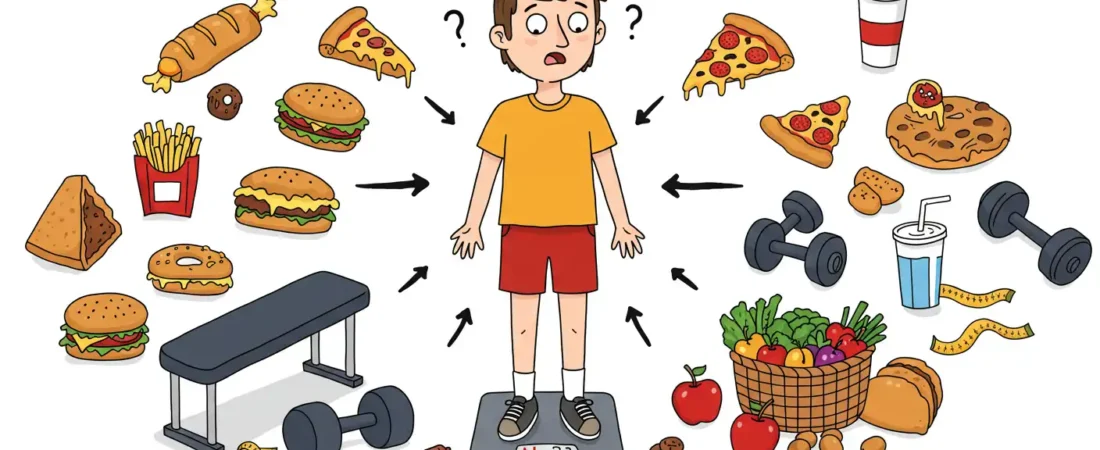Introduction
Avoid the Accordion Effect and Lose Weight With Consistency and balanced habits are the foundation of long-term weight control. For any weight watcher aiming to lose weight, avoiding the dreaded accordion effect rapid weight loss followed by regaining it all back is crucial. A healthy lifestyle supported by daily consistency, healthy food, and emotional balance creates the right environment for sustainable fat loss.
Understanding the Accordion Effect and Its Impact on a Healthy Lifestyle
The accordion effect also known as yo-yo dieting or weight cycling is a frustrating and harmful pattern where individuals repeatedly lose weight only to regain it shortly after. While it may seem like a normal part of dieting, this inconsistent approach to weight management can sabotage your health and slow your metabolism.
Many weight watchers fall into this trap because they rely on restrictive diets that aren’t sustainable. They may cut calories drastically, eliminate entire food groups, or engage in extreme workouts. At first, the results are encouraging. However, once the diet ends or motivation fades, the weight creeps back often with extra pounds.
According to the American Journal of Clinical Nutrition, people who engage in weight cycling tend to accumulate more fat mass and develop reduced metabolic efficiency over time. In other words, the more frequently you gain and lose weight, the harder it becomes to shed it in the future (source).
How the Accordion Effect Disrupts Consistency and Slows Metabolism
One of the biggest challenges to maintaining a healthy lifestyle is staying consistent. The accordion effect interferes with that by creating biological and psychological instability. For instance:
- Drastic calorie deficits may reduce your resting metabolic rate.
- Fluctuations in leptin and ghrelin the hunger hormones can increase cravings.
- Emotional highs and lows caused by diet failure can reduce confidence and increase binge eating behaviors.
Even though healthy food choices are key to sustainable weight loss, many people return to processed or comfort foods when their willpower fades. This inconsistency reinforces the cycle.
“Weight cycling is not only ineffective, but it can be dangerous. It creates a rollercoaster of metabolic confusion,” explains Dr. Krista Varady, nutrition researcher and author of The Every-Other-Day Diet.
The Role of Healthy Food and Weight Watcher Strategies in Breaking the Cycle
Instead of focusing on short-term results, the most successful weight watcher strategies promote consistency. A balanced and realistic approach rooted in healthy food, moderate exercise, and gradual behavior change can avoid the accordion effect and promote long-lasting success.
For example:
- Replace “quick-fix” detoxes with high-fiber, nutrient-rich meals.
- Include protein with every meal to control appetite and support muscle mass.
- Focus on lifestyle changes like mindful eating, meal planning, and sleep hygiene.
Staying consistent doesn’t mean perfection it means creating routines that are realistic and enjoyable. In time, those habits form the foundation of a truly healthy lifestyle.
Why Crash Diets Fail and Hurt Your Healthy Lifestyle Goals

Short-Term Wins That Lead to Long-Term Setbacks
When trying to lose weight, many people fall into the trap of crash dieting, hoping for fast results. Although these extreme plans may deliver rapid weight loss in the beginning, they ultimately undermine both physical health and emotional well-being. Most crash diets rely on a dramatic calorie deficit and lack of healthy food, which not only deprives your body of essential nutrients but also leave you feeling exhausted.
Even worse, crash diets often ignore the psychological patterns that drive overeating in the first place. Without addressing emotional eating or poor food habits, these quick fixes lead to binge cycles and relapse typical features of the accordion effect. After the initial weight loss, people commonly regain all the lost weight and more. Over time, this inconsistency damages metabolism, reduces muscle mass, and increases fat storage.
Instead of focusing on extreme calorie cuts, it’s far more effective to follow a sustainable routine built on healthy food options and a moderate, manageable calorie deficit. This approach allows your body to adjust gradually, minimizing hunger spikes, and keeping you energized throughout the day. As many weight watcher success stories show, long-term change is not about quick wins but about daily choices and consistency.
Building Consistency: The Real Secret to Avoid the Accordion Effect and Lasting Weight Loss

Small Habits Yield Big Results Over Time
If your goal is to lose weight and break free from the frustrating accordion effect, then consistency is your most powerful ally. While it’s tempting to seek fast results, the true transformation lies in doing small things well, every single day. Whether you’re following a structured weight watcher program or simply aiming to live a healthy lifestyle, the key to success is building sustainable habits that reinforce your progress.
Instead of obsessing over the number on the scale each morning, focus on repeated daily actions like preparing healthy food, drinking water, getting 7–8 hours of sleep, and moving your body. These practices, while simple, lead to long-term success and help you avoid the destructive cycle of weight gain and loss that defines the accordion effect.
Ultimately, a successful healthy lifestyle doesn’t rely on willpower alone. Instead, it’s the result of planned systems, prepared meals, and a mindset focused on progress, not perfection.
Smart Nutrition Strategies to Void the Accordion Effect and Lose Weight with Consistency

Focus on High-Protein, Whole Foods to Support a Healthy Lifestyle
One of the smartest ways to avoid the frustrating accordion effect also known as weight cycling, it is to prioritize healthy food choices that support metabolism and satiety. Instead of relying on crash diets or skipping meals, a focus on high protein foods and nutrient-dense options can help you lose weight with consistency.
By incorporating high protein snacks and whole foods into your daily eating routine, you maintain lean muscle mass during a calorie deficit. This not only protects your metabolism but also helps reduce cravings and overeating episodes. For those who follow structured plans like Weight Watcher, these strategies are essential for sustainable success.
Some excellent high protein snacks include:
- Greek yogurt (unsweetened, plain)
- Boiled eggs
- Roasted chickpeas
- Cottage cheese
- Almonds or walnuts
- Tuna packs or grilled chicken strips
These options are easy to prep and store, making them ideal for a busy healthy lifestyle. In fact, research published in The American Journal of Clinical Nutrition confirms that higher-protein diets increase feelings of fullness and reduce total calorie intake throughout the day (source: AJCN).
Furthermore, choosing unprocessed, whole food sources ensures your body gets essential nutrients while minimizing sugar and excess sodium. As you consistently nourish your body with real food, your energy levels improve, and weight loss becomes a side effect of a strong, well-balanced system.
The bottom line? To lose weight without falling into the accordion effect, fuel your body smartly. Consistency in quality nutrition is the secret ingredient to success in any healthy lifestyle.
Emotional Eating and the Psychology Behind The Accordion Effect: A Healthy Lifestyle Perspective

Mindfulness Over Perfection to Avoid the Accordion Effect
In any healthy lifestyle, emotional eating is one of the most overlooked yet impactful challenges when trying to lose weight consistently. Often, stress, loneliness, sadness, or even boredom lead people to crave comfort foods usually high in sugar, fat, and salt. These foods provide temporary relief but ultimately sabotage your goals and may trigger the accordion effect, where weight lost is quickly regained.
While many weight watcher programs offer structured approaches to calorie tracking, it’s equally important to build emotional awareness. That’s where mindfulness comes into play. By practicing techniques like conscious eating, breathing exercises, meditation, and emotional journaling, you reduce impulsive decisions around food. This helps create lasting consistency, which is far more valuable than short bursts of discipline.
Research from Harvard Health Publishing emphasizes that mindfulness-based interventions help reduce binge eating and emotional triggers, leading to more sustainable weight management (source).
To incorporate mindfulness into your daily routine:
- Eat without distractions (no phones or TV).
- Pause between bites and chew slowly.
- Reflect on hunger versus emotion before reaching for food.
- Journal daily thoughts, triggers, and progress.
- Use breathing or relaxation techniques before meals.
These tools not only promote mental clarity but also make it easier to choose healthy food options and avoid overeating. As a result, you gradually lose weight without falling into the trap of the accordion effect.
Remember: perfection is not the goal consistency is. A compassionate and mindful approach toward eating habits leads to deeper transformation than any strict diet ever could.
Exercise That Supports Fat Loss and Lifestyle Stability

Mix Cardio with Strength Training to Avoid the Accordion Effect
When striving to lose weight and build a truly healthy lifestyle, exercise must be seen as a consistent ally rather than a punishment. While it’s true that working out alone won’t erase poor food choices. Combining exercise with proper nutrition greatly reduces the risk of the accordion effect the frustrating cycle of losing and regaining weight.
The secret lies in variety and consistency. A sustainable fitness plan should blend cardiovascular workouts like walking, running, cycling, or swimming with strength training such as weight lifting. Why? Because cardio helps burn calories and improve heart health, while strength training preserves and builds lean muscle essential for maintaining a fast metabolism during a calorie deficit.
Studies from the American College of Sports Medicine confirm that resistance training improves long-term weight management by increasing resting metabolic rate (source). This makes it easier to avoid fat regain, even during minor dietary slip-ups.
As a weight watcher, you don’t need to train like an athlete. Instead, prioritize movement that fits your schedule and brings joy. Whether it’s dancing, group classes, hiking, or strength circuits, the key is showing up regularly.
Here’s how to build a balanced weekly plan:
- 3 cardio sessions (20–45 minutes each)
- 2–3 strength sessions targeting all major muscle groups
- 1 rest or active recovery day (like yoga or light stretching)
And don’t forget: pairing exercise with healthy food, high protein snacks, and emotional self-care creates a strong foundation for long-term success. Together, these habits make your lifestyle resilient and far less prone to rebounds.
In conclusion, consistency in movement not perfection is what helps stabilize weight and avoid the accordion effect. It’s not about burning off every calorie, but about creating a routine that reinforces your health goals every single day.
How Sleep and Stress Impact Your Healthy Lifestyle and Weight Loss Consistency

Rest Is Not a Luxury It’s a Biological Necessity for Avoiding the Accordion Effect
When trying to lose weight and maintain a healthy lifestyle, people often focus exclusively on diet and exercise. However, one crucial yet frequently overlooked pillar of consistent fat loss is quality sleep and effective stress management. Without them, even the cleanest diet filled with healthy food and the most disciplined weight watcher routine can fail to deliver long-term results.
Poor sleep and chronic stress disrupt hormonal balance, particularly levels of cortisol a stress hormone linked to increased fat storage, especially around the midsection.
Therefore, sleep is not optional it’s a biological requirement. Aim for 7 to 9 hours of uninterrupted sleep each night. Just as importantly, establish a consistent bedtime and limit screen time at night to support your body’s natural circadian rhythm. Quality sleep enhances insulin sensitivity, supports muscle recovery, and helps regulate appetite hormones like ghrelin and leptin, all of which contribute to a stable weight.
To complement this, actively reduce stress throughout your day. Incorporating mindfulness techniques such as deep breathing, journaling, gentle yoga, or nature walks can dramatically improve mental clarity and emotional resilience. These practices create a healthier emotional environment that reduces the likelihood of emotional eating a common trigger for weight fluctuations.
Ultimately, consistency in rest and stress reduction is just as essential as eating high protein foods or hitting the gym. When your body is well-rested and your mind is calm, you make better food choices, recover faster, and are far more likely to maintain your progress rather than slipping back into the accordion effect.
Setting Realistic Goals for Weight Loss Success and Consistency

Think Long-Term, Not Quick Fixes, to Avoid the Accordion Effect
When it comes to maintaining a healthy lifestyle, setting realistic goals is crucial for consistent weight loss and long-term success. While the idea of losing a large amount of weight quickly may be tempting, the truth is that quick fixes such as crash diets or extreme exercise routines often lead to disappointment, and may even contribute to the accordion effect.
Instead of focusing on short-term results, shift your mindset to thinking about long-term, sustainable changes. To achieve this, SMART goals (Specific, Measurable, Achievable, Relevant, and Time-bound) are essential. For instance, rather than attempting to lose 10 pounds in a week, set a goal to lose 1–2 pounds per week, keeping your energy levels up and avoiding stress-induced mood swings.
Breaking Down SMART Goals for Weight Loss
- Specific: Clearly define your goal, e.g., “Lose 1 pound per week” instead of “I want to lose weight.”
- Measurable: Track your progress with tools like food journals, workout logs, or fitness apps.
- Achievable: Set goals that are challenging but realistic, ensuring that your expectations align with your current fitness level.
- Relevant: Your goals should be meaningful to your lifestyle and contribute to overall health not just the number on the scale.
- Time-bound: Set deadlines for achieving your milestones, such as a specific weight loss goal by the end of the month or year.
By focusing on small, consistent goals, you not only stay motivated but also create a healthier, more balanced approach to weight loss is necessary to avoid the accordion effect. Slow progress is still progress, and as you make sustainable changes, you’ll see lasting results.
Tracking Progress Without Obsession: Focus on Overall Health, Not Just Weight

Use Metrics That Reflect Health, Not Just Weight
When it comes to tracking your progress, focusing solely on the number on the scale can be misleading and discouraging. The truth is, weight is just one of many metrics that can reflect your health. It’s important to understand that true progress is not solely defined by weight loss. Especially when working toward a healthy lifestyle and avoiding the accordion effect.
Instead, track other indicators that provide a more holistic view of your journey. For example, how your clothes fit, your energy levels, your sleep quality, and even improvements in strength or endurance are all important factors in measuring success.
Key Metrics for Tracking Health Progress
- Clothing Fit: As you lose fat and gain muscle, you may notice that your clothes fit differently, even if the scale doesn’t show a dramatic change. This is a great sign that your body is reshaping, which can be even more rewarding than just focusing on weight loss.
- Energy Levels: Tracking your daily energy can help gauge the positive impact of your lifestyle changes. If you feel more energized throughout the day, it’s a sign that your nutrition and exercise routines are positively affecting your body.
- Sleep Quality: Quality sleep is essential for weight loss and overall health. Improved sleep can indicate that your body is recovering better and that your stress and lifestyle habits are improving.
- Strength and Endurance Gains: Strength training and cardiovascular exercises can show progress through increased stamina and muscle strength, which are excellent markers of physical health.
By focusing on these aspects, you can avoid obsessing over the scale and celebrate other important non-scale victories. Remember, health is about more than just losing weight it’s about feeling your best, both physically and mentally.
Final Thoughts: Choose a Healthy Lifestyle Over Dieting Trends
Consistency, a healthy lifestyle, and an understanding of the accordion effect are what make weight loss sustainable. Avoid shortcuts, choose healthy food, and stay committed even on the hard days. This approach transforms you from a weight-loss struggler to a confident weight watcher in control of your health.






